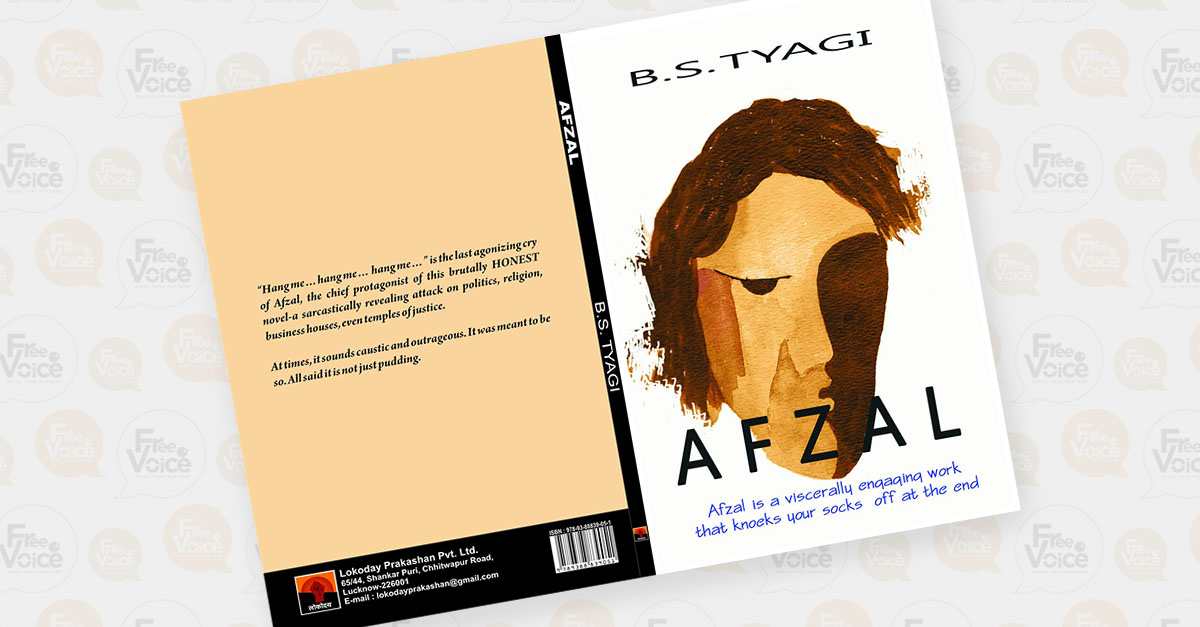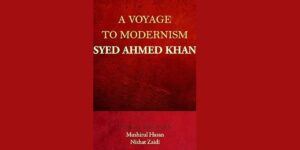Afzal
B S Tyagi
ISBN: 978-93-88839-05-1, pp-289
Publisher: Lokoday Prakashan, Lucknow
2019
Rs.300
Question or not to Question
‘Who has done all this—Muslim or Christian or someone else? Are they less than terrorists? Why aren’t they dubbed terrorists? Why aren’t they detained under POTA? Why don’t people shout –hang them? Or spit at them? Why aren’t these rapists hanged publicly?’
So many questions of Afzal go unanswered.
B S Tyagi is an acclaimed Indian bilingual writer, poet, reviewer, storyteller, novelist, and translator. Some of his books are The Political Philosophy of Dr S Radhakrishnan (1994), Judicial Activism in India (2000), Coalition Politics: The Indian Experience (2008), Wait (2013), Insaf (2017), Dai Ma and Other Stories (2018), The Burning Night (2020).
The Story
Tyagi’s novel under review, Afzal, has three parts. It has a linear narrative. The introductory part, ‘Out of the Ashes’, is a scintillating historical account of the Azampur town in North Uttar Pradesh and the heroic participation of its people in India’s freedom struggle. The story comes alive through the mythic narrative of Kazi Sahab, the last courtier of Azam Khan, after whom the town was named. The second part, ‘The Escapades,’ details Afzal’s harrowing odyssey in post-independent India, where he encounters myriad shoddy and humiliating experiences as a job seeker.
His stays at Imran Pahalwan’s City Garage as an apprentice mechanic, as an ashram member at Mukti Ashram, at Professor Tripathi’s house as a cab driver, and as a domestic helper at a famous judge’s house—are an eye opener to the straightforward, moneyed, unscrupulous, lusty, dishonest ways to postmodern Indian life. Disillusioned, he returns home only to be picked up by the police as a mastermind in the Jaipur Triple Blast case. And the concluding part, ‘Hamam’, engages us in how Afzal is dragged into politics as a ploy. He quickly learns the techniques of earning and wielding power. He is now a leader of the masses. Universities are offering an honorary doctorate to him. Azampur is proud of its son of the soil. However, Afzal considers his whole life, validates his pure and sinful days, and comes to terms with his authentic self.
From Afzal to Vedant & Narayan
At Mukti Ashram Afzal is rechristened as Vedant.
One day Maharajji inducted him into the fold of his disciples by blessing him with a new name-Vedant and gave him a set of saffron clothes. Now he was happy to be an inmate of the Mukti Ashram.
Before joining the judge’s house as a domestic helper, Afzal’s name is changed by his introducer. Afzal is confused.
Afzal wanted to know why Satish had changed his name. He was a bit fearful about his identity. If the judge learnt about his Muslim identity, it could land him serious trouble. He didn’t want to hide anything. He was proud of his name. He wanted to live and work with his real name. He had done nothing wrong or shameful. He had been honest and hardworking in life…
‘Why did you change my name?’ asked him (Afzal)
‘Because I didn’t want you to lose this job?’
So Afzal’s pride in his name is mowed down. ‘Today he buried deep Afzal-straightforward Afzal. He was Narayan-a new man working in a judge’s house.’ Changing Muslim names into Hindu ones to save a job or a life is not at all an unprecedented phenomenon in contemporary India. Muslims are stereotypically represented in cultural or daily living spaces as villains, betrayers, terrorists, rapists, and whatnot. They are systematically denied entry into posh housing areas, decision-making bodies, and opinion-making platforms. The novelist, through the mutilation of Afzal’s name and its resultant humiliation, has effectively punctured the myth of ‘hindu-muslim bhai bhai’ or Nazrul Islam’s ‘Eke brinte duti kusum hindu musalman. Animosity, hatred, and intolerance are deeply entrenched in the blood of both communities. The gap between the two cultures is widening day by day.
Religious Bigotry
Afzal also lays bare the ugly tentacles of religious bigotry. Mukti Ashram has the luxury of a five-star hotel. The maharajas and the VIP guests enjoy the pleasure of flesh by sleeping with pretty foreign girls. Yes. At the Mukti Ashram! Here the author scathingly attacked modern-day religious hypocrisy. Here is no ‘mukti’; Ashram’s walls are draped with carnal desire. Afzal is a witness to the immorality and sexual laxity of the inmates of the famed ashram.
He stopped holding his breath near the window of Veetraji’s room. He strained to listen, but there was no voice. The door opened silently. He retreated and stood aside. A woman slipped out of the room, tiptoed. It was Ma Sadhana! She hurried down the stairs bare feet and disappeared into her room.
Darkness
The concluding chapter, ‘I am Afzal,’ is a stunning attempt to claim his real identity—an honest, hardworking, loyal Muslim boy. In a trance, he murmurs the checkered happenings of his life. He had seen and known much of the world. He comes to realize the bitter truths he experiences through his strange journey —Mukti Ashram is much like a harem, Professor Tripathi is a cheater and morally degradable, Chhote Masterji is a fraud, criminal and seasoned politician whose farmhouse is flooded with the flow of wine and women, corrupt uniformwallahas and their rotten bosses, corrupt judge and his twin wayward daughters’ night revelries, at City Garage Ustad’s shoddy night dealings and his bonhomie with the police, media and lawyers can be easily bought and the peoples who spat on him as mastermind are now ready to lick his boots. The charisma of power! Corruption both in private and public life; religious bigotry; lust for unaccounted wealth wine, women; paid media, paid judges; moral degeneration and ethical devaluation both in private and public life; police brutality, jingoism, and hatred have painted Afzal, who was once honest, hardworking and loyal, black from head to toe.
Reclaiming Self
Afzal’s transformation, however, from a poor village boy to an influential political leader does not steal the aura of his pure and innocent soul. He has done many wrongs. Yes, he is a sinner. But is he singularly culpable for his fall from grace? The novel is a befitting answer.
Afzal, however, takes all ills on his shoulder and frantically calls for his punishment, ‘Hang me…hang me…hang…hang…ha…h…h…’.Here lies his greatness and kindness. In the author’s words, ‘Afzal-the protagonist, proves himself to be the guru of all that had taken him so lightly.’ He is culturally ‘other’, poor, and not qualified enough for white-collar work. But his honesty, openness, and politeness are conspicuously absent among his highly skilled, socially sophisticated bosses.
Tyagi’s language is simple, evocative and resonant. There is music in words and phrases, and sentences.
Why We Read?
Afzal is a must-read for its heterogeneous structural threads, ranging from Azampur’s past glory to present penury and allegedly a terror hub, from political corruption to spiritual hollowness, from moral degeneration in public life to private debauchery and dishonesty, from money power to lust for wine and women, from sectarian and communal turpitudes to ghettoisation of post-independent Indian Muslims and its corrosive effects on syncretic socio-cultural edifices. I love this book because it demystifies the myth of communal harmony, the tale of vibrant Indian democracy, the myth of India as an oasis of spiritual bliss, and the myth of accountability of public servants. Afzal is a tight slap on our face! The ugly fact is that corruption, hatred, power, wine, and women rule the roost. The novel is a brilliant commentary on contemporary India.




